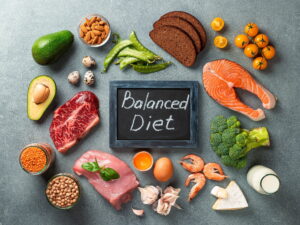A healthy gut is crucial for overall health, as it influences digestion, nutrient absorption, immunity, and even mood. The gut microbiome, which consists of trillions of bacteria living in the digestive tract, is crucial for maintaining proper balance in the body. A healthy gut helps break down and absorb nutrients, reduces inflammation, and strengthens the immune system. On the other hand, poor gut health can, over time, lead to bloating, indigestion, constipation, and even more serious problems. Therefore, your diet significantly impacts your digestion and gut balance.
Eating Plenty of Fiber Promotes Digestion
Fiber is one of the most important nutrients for healthy digestion, as it helps transport substances through the digestive tract and prevents constipation. Fiber comes in two main forms: soluble and insoluble. Each type promotes digestion in its own way. Soluble fiber absorbs water and turns into a gel-like substance, which slows digestion and helps maintain stable blood sugar levels. Insoluble fiber, on the other hand, adds bulk to your stool, helping you have regular bowel movements. Fruits, vegetables, whole grains, legumes, and nuts are all excellent sources of fiber. Eating a varied, fiber-rich diet not only promotes digestion but also feeds the beneficial bacteria in your gut, strengthening your gut microbiome.
Staying Hydrated for Optimal Digestion
Water is essential for digesting food, absorbing nutrients, and removing waste from your intestines. If you don’t drink enough water, your digestion slows down, leading to constipation and pain. Drinking plenty of water throughout the day helps keep your bowels clean and prevents stomach upset. Water-rich herbal teas and foods like cucumbers, watermelon, and oranges also help you stay hydrated. One of the easiest and best ways to ensure a healthy digestive system and a healthy stomach is to drink enough water.
How Probiotics Help Your Gut
Probiotics are beneficial bacteria in your gut that help you digest food properly. Consuming foods rich in probiotics helps maintain a balanced gut flora, making it easier for your body to absorb nutrients and relieving digestive issues like diarrhea or bloating. Fermented foods like yogurt, kefir, sauerkraut, kimchi, and miso are rich in probiotics. These foods help strengthen the gut lining, boost the immune system, and improve the functioning of the entire digestive system. Regular probiotic supplementation helps keep your gut healthy and strong.
Reduce Your Intake of Processed Foods for a Healthier Gut
Consuming large amounts of processed foods high in sugar, fat, and additives can harm your gut health. These foods often promote the growth of harmful bacteria, disrupting the balance of your gut flora and causing digestive issues like bloating or inflammation. Reducing your intake of sugary snacks, fried foods, and highly processed foods can help relax your digestive tract. Instead, by reducing your intake of processed foods, you can provide your body with natural nutrients and promote the growth of beneficial gut bacteria, improving digestive function and reducing your risk of long-term digestive problems.
Eat Mindfully for Better Digestion
When it comes to your digestion, how you eat is just as important as the food itself. Eating too quickly or in large quantities can put extra strain on your digestive system, potentially leading to discomfort, bloating, or indigestion. Eating mindfully—taking time to chew, savoring your food, and paying attention to hunger cues—helps your body digest food better. Eating in a quiet place, away from distractions like phones or television, can also help your body break down food and absorb nutrients more effectively. Mindful eating is a simple and effective way to naturally improve your gut health.
Managing Stress to Protect Gut Health
Stress can significantly impact digestion and gut health due to the close connection between the brain and gut. When you experience high levels of stress, your digestive system can become disrupted, leading to abdominal pain, diarrhea, constipation, or irritable bowel syndrome. Eating a balanced diet and avoiding excessive amounts of coffee or sugar can help maintain stable energy levels and help you manage stress. Deep breathing, meditation, and yoga are all ways to relax your body and mind, which can help your gut function better and reduce stress. Managing stress is an important step toward better digestion and a healthier gut.
Conclusion
One of the best ways to promote your digestion and gut health is to eat healthily. Consuming adequate fiber, probiotics, and prebiotics helps maintain your microbiome and improve digestion. Drinking enough water and paying attention to your diet can also promote digestive health. Limiting processed foods, managing stress, and getting enough sleep are also important for maintaining a healthy gut. By making simple but consistent changes to your diet and lifestyle, you can significantly improve your digestion and overall well-being. A healthy gut not only promotes digestion but also improves energy, immunity, and long-term health.
FAQs
1. Which foods are beneficial for gut health?
Yogurt, kefir, garlic, onions, whole grains, and vegetables are all rich in dietary fiber, probiotics, and prebiotics, which are beneficial for gut health.
2. Do probiotics really promote digestion?
Yes, probiotics support the good bacteria in the gut, allowing the body to better absorb nutrients and relieving digestive issues like bloating and constipation.
3. How much water should I drink to promote digestion?
Most adults should drink 7 to 9 glasses of water daily, but this can vary depending on their activity level and the weather.
4. Are processed foods really detrimental for the gut?
Consuming large amounts of processed foods can disrupt the bacterial balance in the stomach, which can lead to digestive problems and other health issues.
5. Does stress cause digestive problems?
Yes, stress can worsen digestive problems and disrupt gut function. Therefore, managing stress is crucial for gut health.




